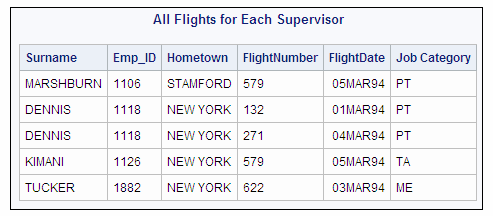SQL Procedure
- Syntax
 Procedure SyntaxPROC SQL StatementALTER TABLE StatementCONNECT StatementCREATE INDEX StatementCREATE TABLE StatementCREATE VIEW StatementDELETE StatementDESCRIBE StatementDISCONNECT StatementDROP StatementEXECUTE StatementINSERT StatementRESET StatementSELECT StatementUPDATE StatementVALIDATE Statement
Procedure SyntaxPROC SQL StatementALTER TABLE StatementCONNECT StatementCREATE INDEX StatementCREATE TABLE StatementCREATE VIEW StatementDELETE StatementDESCRIBE StatementDISCONNECT StatementDROP StatementEXECUTE StatementINSERT StatementRESET StatementSELECT StatementUPDATE StatementVALIDATE Statement - Overview
- Examples
 Creating a Table and Inserting Data into ItCreating a Table from a Query's ResultUpdating Data in a PROC SQL TableJoining Two TablesCombining Two TablesReporting from DICTIONARY TablesPerforming an Outer JoinCreating a View from a Query's Result Joining Three TablesQuerying an In-Line View Retrieving Values with the SOUNDS-LIKE Operator Joining Two Tables and Calculating a New ValueProducing All the Possible Combinations of the Values in a ColumnMatching Case Rows and Control RowsCounting Missing Values with a SAS Macro
Creating a Table and Inserting Data into ItCreating a Table from a Query's ResultUpdating Data in a PROC SQL TableJoining Two TablesCombining Two TablesReporting from DICTIONARY TablesPerforming an Outer JoinCreating a View from a Query's Result Joining Three TablesQuerying an In-Line View Retrieving Values with the SOUNDS-LIKE Operator Joining Two Tables and Calculating a New ValueProducing All the Possible Combinations of the Values in a ColumnMatching Case Rows and Control RowsCounting Missing Values with a SAS Macro
Example 10: Querying an In-Line View
| Features: |
FROM clause : in-line view |
| Table names: | PROCLIB.STAFF2 |
This
example shows an alternative way to construct the query that is explained
in Joining Three Tables by joining one of the tables with the results of an in-line
view. The example also shows how to rename columns with an in-line
view.
Program
libname proclib 'SAS-library';
proc sql; title 'All Flights for Each Supervisor'; select three.*, v.jobcat
from (select lname, s.idnum, city, flight, date
from proclib.schedule2 s, proclib.staff2 t
where s.idnum=t.idnum)
as three (Surname, Emp_ID, Hometown,
FlightNumber, FlightDate),
proclib.superv2 v
where three.Emp_ID=v.supid;Program Description
Select the columns.The SELECT
clause selects all columns that are returned by the in-line view (which
will have the alias Three assigned to it), plus one column from the
third table (which will have the alias V assigned to it).
Specify the in-line query.Instead
of including the name of a table or view, the FROM clause includes
a query that joins two of the three tables. In the in-line query,
the SELECT clause lists the columns to select. IdNum is prefixed with
a table alias because it appears in both tables. The FROM clause lists
the two tables for the join and assigns an alias to each table. The
WHERE clause specifies the columns that join the tables. The STAFF2
and SCHEDULE2 tables have an IdNum column, which has related values
in both tables.
from (select lname, s.idnum, city, flight, date
from proclib.schedule2 s, proclib.staff2 t
where s.idnum=t.idnum)Specify an alias for the query and names for the columns.The alias Three refers to the results of the in-line
view. The names in parentheses become the names for the columns in
the view.
Copyright © SAS Institute Inc. All rights reserved.
